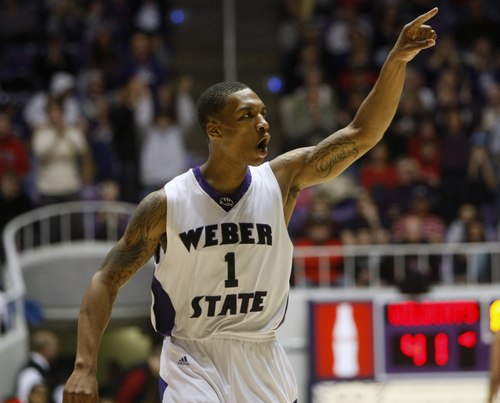This is an archived article that was published on sltrib.com in 2012, and information in the article may be outdated. It is provided only for personal research purposes and may not be reprinted.
When Damian Lillard announced in April he was leaving Weber State to play in the NBA, experts projected him as a middle-to-late first-round draft pick.
But things change.
Along with other top prospects, Lillard will attend draft festivities in Newark, N.J., on Thursday night. He is expected be one of the first players to hear his name called by commissioner David Stern.
In the weeks leading up to the draft, Lillard improved his draft status by showing teams at the NBA combine and during individual workouts that he is more athletic, physical and well-rounded offensively than previously thought.
As a result, Lillard is expected to be the eighth player from a Utah school in the last 20 drafts to becomea lottery pick, joining the likes of Andrew Bogut, Keith Van Horn and Shawn Bradley.
"He kept himself in great shape and showed everybody that he's a strong and physical guy," said NBA director of scouting Ryan Blake.
Lillard also demonstrated he knows the game and has a knack for running an offense — burying the notion that college basketball's second-leading scorer last season is one-dimensional and simply overwhelmed inferior competition in the Big Sky Conference.
"That [scoring] gets you a lot of attention," Blake said. "But he's very efficient and plays within himself. He doesn't try to be a risky-type guy. He lets plays develop in front of him."
New Orleans, Charlotte, Washington, Cleveland and Sacramento own the first five picks in the draft.
Kentucky's Anthony Davis, Kansas' Thomas Robinson, Florida's Bradley Beal, North Carolina's Harrison Barnes and Kentucky's Michael Kidd-Gilchrist are expected to be the first players selected.
Lillard will almost certainly be picked between No. 6 and No. 11.
Some NBA personnel-types believe the ex-Weber star is worthy of the top five, except Washington, Cleveland and Sacramento pick directly ahead of No. 6 Portland and aren't looking for a quarterback.
The Wizards' point guard is John Wall, the No. 1 overall pick in the 2010 draft. The Cavaliers' point guard is Kyrie Irving, who was the top pick in 2011. The Kings' stable of ballhandling guards includes Tyreke Evans, last year's rookie surprise Isaiah Thomas and former BYU star Jimmer Fredette.
The bottom line: Lillard will likely be available at No. 6 and Portland is seriously considering him, partly because veteran point guard Raymond Felton struggled with consistency last season.
Felton averaged 11.4 points per game but shot only 40.7 percent from the field, including 30 percent from the 3-point line.
Lillard participated in a solo workout for the Trail Blazers last week in Portland.
Afterward, he told reporters, "I could see it happening. I hope so. I think I really fit in here. It's a great situation. I did as good a job as I could have to show them I could be a pick for them."
Lillard has also worked out for Sacramento, Golden State, Toronto and Houston, which owns the 14th, 16th and 18th picks but is interested in moving up.
At No. 8, Toronto needs a point guard. So does New Orleans at No. 10.
The Hornets will take Davis with the first pick, so putting Lillard with him would give New Orleans a young, diverse foundation.
If Lillard isn't taken in the top 10, Portland picks again at No. 11. The chances of the Blazers passing on Lillard twice seem miniscule.
One thing is clear: By working out so well in recent weeks, Lillard cemented his status as the premier point guard in a draft without the usual quality or depth at his position.
North Carolina's Kendall Marshall and Kentucky freshman Marquis Teague are considered the next-best point guard prospects.
Marshall has an outside chance of being picked in the top 10 but will more likely go in the middle of the first round. Teague is considered a late first-rounder. —
Utahns who hit the lottery
Players from Utah schools taken in the draft lottery since 1990:
2011 • Jimmer Fredette, BYU, No. 10, Milwaukee (traded to Sacramento)
2005 • Andrew Bogut, Utah, No. 1, Milwaukee
2004 • Rafael Araujo, BYU, No. 8, Toronto
1999 • Andre Miller, Utah, No. 8, Cleveland
1998 • Michael Doleac, Utah, No. 12, Orlando
1997 • Keith Van Horn, Utah, No. 2, Philadelphia (traded to New Jersey)
1993 • Shawn Bradley, BYU, No. 2, Philadelphia —
NBA Draft
Thursday, 5 p.m
TV • ESPN



